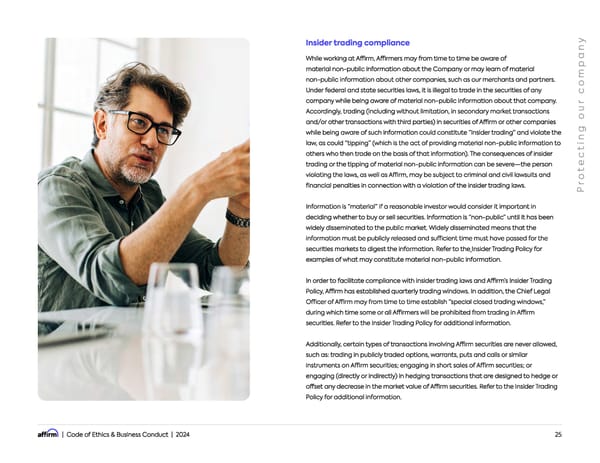| Code of Ethics & Business Conduct | 2024 25 Insider trading compliance While working at Affirm, Affirmers may from time to time be aware of material non-public information about the Company or may learn of material non-public information about other companies, such as our merchants and partners. Under federal and state securities laws, it is illegal to trade in the securities of any company while being aware of material non-public information about that company. Accordingly, trading (including without limitation, in secondary market transactions and/or other transactions with third parties) in securities of Affirm or other companies while being aware of such information could constitute insider trading and violate the law, as could tipping (which is the act of providing material non-public information to others who then trade on the basis of that information). The consequences of insider trading or the tipping of material non-public information can be severethe person violating the laws, as well as Affirm, may be subject to criminal and civil lawsuits and financial penalties in connection with a violation of the insider trading laws. Information is material if a reasonable investor would consider it important in deciding whether to buy or sell securities. Information is non-public until it has been widely disseminated to the public market. Widely disseminated means that the information must be publicly released and sufficient time must have passed for the securities markets to digest the information. Refer to the Insider Trading Policy for examples of what may constitute material non-public information. In order to facilitate compliance with insider trading laws and Affirms Insider Trading Policy, Affirm has established quarterly trading windows. In addition, the Chief Legal Officer of Affirm may from time to time establish special closed trading windows, during which time some or all Affirmers will be prohibited from trading in Affirm securities. Refer to the Insider Trading Policy for additional information. Additionally, certain types of transactions involving Affirm securities are never allowed, such as: trading in publicly traded options, warrants, puts and calls or similar instruments on Affirm securities; engaging in short sales of Affirm securities; or engaging (directly or indirectly) in hedging transactions that are designed to hedge or offset any decrease in the market value of Affirm securities. Refer to the Insider Trading Policy for additional information. P r o t e c t i n g o u r c o m p a n y
 2024 Code of Ethics Page 25 Page 27
2024 Code of Ethics Page 25 Page 27